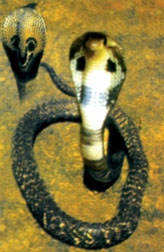
If your pet is bitten by a snake...
 Your beloved pet is running around the garden, and may be even
outside, all the time. It's so playful that it tries to play with every
thing it comes across in the garden or outside. What if it comes across
a poisonous snake, such as a cobra, and starts playing with the reptile?
The snake will surely bite it. Don't panic! Our veterinarian Dr. D. A.
U. Samankumara of the Kirindiwela Animal Clinic will this week tell you
about snakes and what you should do if your pet is bitten by one. Your beloved pet is running around the garden, and may be even
outside, all the time. It's so playful that it tries to play with every
thing it comes across in the garden or outside. What if it comes across
a poisonous snake, such as a cobra, and starts playing with the reptile?
The snake will surely bite it. Don't panic! Our veterinarian Dr. D. A.
U. Samankumara of the Kirindiwela Animal Clinic will this week tell you
about snakes and what you should do if your pet is bitten by one.
Of the 96 varieties of snakes recorded in Sri Lanka, only a few have
an effective venom injecting system known as the venom apparatus. These
are called venomous snakes. Snakes can be grouped according to the
degree of local and systemic (in the body) reactions, which they produce
in the envenomed or attack victim: They are Highly venomous, Moderately
Venomous and Dangerous snakes.
Highly venomous snakes
These snakes have the venom apparatus and produce highly dangerous
venom. A bite could cause mild to severe local and systemic reactions,
which may even be fatal. In Sri Lanka there are six species of highly
venomous snakes on land.
One is the Krait or Karavala in Sinhala. It is highly venomous though
its venomous gland is small. It can be identified from its black and
white rings; the neck is not prominent The Common krait and Ceylon krait
are widespread here. They are common in some seasons, especially from
August to November.
They are more active at night when most bites occur. The danger here
is that the victim won't feel the bite, but will get an unbearable
abdominal pain about an hour later. Post-mortems have revealed blood in
the victim's stomach. The victim will have breathing problems and could
die of respiratory paralysis.
The Cobra (Najanaja) is also highly venomous. They can be easily
recognized, because of the hood and ventral and dorsal markings. Cobra
venom contains a neuron toxin, which affects the neuron system.
Russell's Viper or Thith Polanga, is also highly venomous and has a
triangular head with a 'V' mark on it. There are three rows of spots
along its body.
Saw-scaled Viper (weli-polanga) is a venomous small snake with a
cross mark on its triangular head. Although it's one of the most
dangerous serpents in the world, the Sri Lankan saw-scaled viper is not
that venomous. It's because this serpent generates venom when it is
hungry and looking for food, but luckily, at its local habitats, it gets
enough food.
The Slender Coral Snake or the 'Depath Kaluwa' is another member of
this family. It's also venomous. Its head, neck and body are the same
width, while its tail and mouth are very small. This snake is about
30cm-50cm in length and light brown in colour.
Moderately venomous snakes These snakes cause mild to severe local
and systemic reactions, but only a small percentage of the bitten
victims actually die. The Humped-nose Viper, a small snake with a
triangular head, a raised snout, pits between the eyes and nostrils and
a prominent neck; and the Green Pit Viper, a large snake with a
triangular head, prominent neck and pits between the eyes and the
nostrils, are examples.
Mildly venomous snakes
These are snakes whose bites do not cause any serious local or
systemic reaction, e.g., Cat Snake, Sri Lankan Cat Snake, Gamma Snake,
Barne's Cat Snake, Forsten's Cat Snake, Vine Snake and Green Vine Snake.
Treatment
If a snake bites your pet, try to reduce its(your pet's)activities
and make it calm. Because, when it's active, the blood circulation is
faster and the probability of spreading the poison throughout the blood
is high. So, what you can do is, first wash the bite wound with tap
(running) water and soap. Give the animal a lot of liquids like water,
milk, or if you have the facility, saline.
Rush your pet to a veterinary surgeon, because if he/she could give
your pet the anti-venom as soon as possible, your pet's life will be
safe. Anti-venoms are available for almost all these snakes, except for
the Ceylon Krait. Because anti-venoms are imported to our country from
India, they are available only for snakes, which are found in India too.
In case a Ceylon Krait bites your pet, what you can do is, give your
pet more liquids to drink. This will induce the creation of more blood
cells, thus reducing the concentration of poison in the blood. The
danger to your pet's life might thereby be reduced.
Janani Amarasekara
|


